An important study just got my attention. Patients and clinicians in different cities were asked questions about concerns and preferences. Titled “Insights for Internists: ‘I Want the Computer to Know Who I Am’,” the study reports: (emphasis added)
- Patients do keep their own medical records
- They want access to everything in their record
- Privacy worries “appeared to fade rapidly in the face of the desire to have records fully available in emergency settings and with multiple and new providers”
 “health professionals professed far more concern about maintaining privacy than patients.”
“health professionals professed far more concern about maintaining privacy than patients.”- They understand that their clinicians are busy/stressed, they want the information to supplement and make their (clinicians) work more efficient, not less
Boy do I wish we’d all known about this during the debates about meaningful use and medical records this summer! There was so much talk about “Well what do people want?” and “Won’t patients be overwhelmed? They won’t be able to understand it.”
And here’s the thing: it was published back in May, and the research was done THREE YEARS AGO, Nov. 2006 to Jan. 2007.
How’s that for a great example of the “lethal lag time” we talk about in the e-patient white paper? That’s the delay between when new knowledge comes into existence and when it’s made its way through the publication system, for use by decision-makers. Three years, in this case.
Thanks to the always magnificent, e-patient-minded Ted Eytan, MD for highlighting this study on his blog Friday.






I’m stunned (in a good way) – as the above comment says, that article was posted on their site the same day.
Here’s where you can subscribe to updates from their site.
Dave,
I’m wondering if the same issues around privacy exist for controversial diagnoses. For example, psychiatric patients may not want their records to be made fully electronic, for good reason. To this day, discrimination exists even within the medical community against psychiatric patients who have physical illnesses. Which is why they tend to have higher rates of morbidity and mortality than others.
It can literally kill you if a Doctor finds out you are on antidepressants.
And employers? Automatically fire anyone with a psychiatric diagnosis. Child welfare authorities are more than happy to seize children from parents on a precautionary basis, with no evidence of harm. Even though patients who take their medication are better workers, and better parents.
Same for women who have had abortions, or even prenatal diagnosis. In the old days, they would have been recorded correctly in paper files but only billed as D&Cs, which could be post-miscarriage D&Cs, to protect the lives of Doctors and the identity of patients. Pro-lifers have stated quite clearly that they will kill women. Do you think they can’t hire a hacker? I bet they can.
I appreciate that security exists for people concerned about privacy, but the problem is that even one slip can destroy a life, or destroy a career. And the penalties so far are a joke. They need to be jailable offenses.
A leg x-ray is not the same thing as a depression diagnosis.
So I am quite happy to sit back and wait a nice long time for E-Records. I like staying alive.
As one of the co-authors of the article “Insights for Internists: ‘I Want the Computer to Know Who I Am’I find it unfortunate that the results of this study took so long to become publically known. It will always take years to get the work published in peer review journals but I think Twitter and other social media platforms can and will change that long delay for key findings.
DKA
Aurelia,
I hope I didn’t create the wrong impression. I personally don’t assert that everyone does or should want the same thing – IMO that would defeat the whole idea of empowering the individual. And nothing could be more important to me than patients having the right to keep confidential anything they want to.
DKA,
What a pleasure to have you here! Thanks for stopping by!
Have you read the linked item in the post about the “lethal lag time”? I’d love to hear your thoughts. And yes, I also love the idea of using social media to transform this lag, during which the information exists but hasn’t reached the eyes that need it.
In my ACOR kidney cancer group it’s common for people (“just patients”) to bring new information to their physicians’ attention, because of course the patient has time to be a deep specialist. Not an oncologist, but deep and focused.
I hope you’ll consider writing something for the Journal of Participatory Medicine about this. We seek articles. Please see the introductory essays at JoPM.org.
Hi David,
Great to see you here and thank you for the article!
There are upcoming solutions to help all of us deal with the publication “lag time”. The one that I have been studying and may soon use for portions of the Journal of Participatory Medicine, is Knol, the publishing platform from Google that is currently used by PLoS Currents to maximize the fast dissemination of peer-reviewed scientific material about H1N1.
Look at http://knol.google.com/k/plos-currents-influenza for an example of what can be achieved in terms of free, fast, moderated, widely available dissemination of knowledge.
Gilles,
Yes, thanks for the introduction to Knol. I think you’re right about new tools I’m venues such as JoPM will enable more rapid outcomes and dissemination.
DKA
Hi David,
Nice to see you here and thank you for the article!
Look at http://askformesothelioma.blogspot.com/ for an example of what can be achieved in terms of free, fast, moderated, widely available dissemination of knowledge.
Thanks
I bookmarked this site a while ago because of the informative content and I have never been let down. Continue the outstanding work.